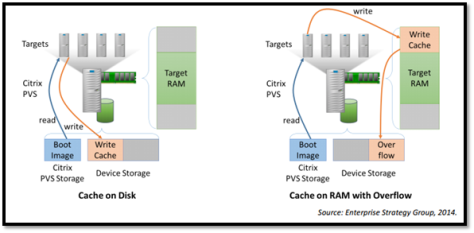You’ve heard the news, you’ve seen the videos, and now the storage savings have been verified! According to an ESG report, the new RAM Cache with Disk Overflow feature, included in the XenApp and XenDesktop 7.6 release, has the potential to reduce storage costs by 80% or more. Now before you stop reading thinking this is too good to be true, think about the storage cost problem for a moment.
Storage costs associated with RDS/VDI solutions is for throughput and not space. We need to have enough throughput or IOPS so the user experience doesn’t suffer. And believe me, it can suffer drastically, as you can easily see in this simple demonstration (pay particular attention from the 3 to 4 minute mark J).
To visualize how this works, take the following diagrams into perspective

IO is destined for the disk. Disks are slow when compared to RAM. So the Cache on RAM with Overflow feature substitutes RAM for disk. And because RAM is not infinite, we will overflow portions of the RAM to disk as needed. But even this overflow is more efficient. The overflow is sequenced and consolidated into large, sequential blocks of data instead of small, random blocks.
Many implementations required massive SANs or expensive SSDs. People were spending large amounts of money on storage, not for space, but instead to achieve the throughput required by RDS/VDI. With the Cache on RAM with Overflow feature, we can drastically reduce the number of disks. We don’t need hundreds of disks to give us our throughput. We don’t need to implement SSDs. We can drastically reduce our disk count and focus more on storage space, which is by far, easier and cheaper to implement.
According to the ESG report on Provisioning Services, when you focus on disk throughput
- A XenDesktop implementation requiring 26 disks can be reduced to 3
- A XenApp implementation requiring 74 disks can be reduced to just 4
And because of the way this feature works, it provides value to multiple hypervisors.
From the virtual mind of Virtual Feller
Follow @djfeller